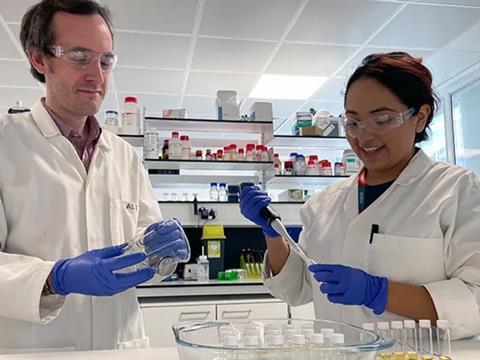
Scientists at King’s College London have utilized an enzyme often found in biological laundry detergents to degrade and recycle single-use bioplastics used in coffee cups and food containers, aiming to achieve a circular system.
Published in Cell Reports Physical Sciences, the chemical recycling method is said to break bioplastics down into soluble fragments within the space of 24 hours – a process 84 times faster than the twelve weeks it takes to degrade bioplastic materials in industrial composting conditions.
In a further 24 hours and at a temperature of 90°C, single-use polylactic acid (PLA) plastics degrade into their chemical building blocks. These monomers, or single molecules, can apparently be reconstructed into new plastics of equal quality, which can then be used to create new packaging.
This process hopes to counteract the imbalance between high plastic production rates and industrial efforts to dispose of them sustainably. According to OECD’s calculations, the amount of plastic waste produced globally will nearly triple by 2060; around half of the overall figure is expected to end up in landfill and less than a fifth recycled.
Earth Action adds its estimation that over 68 million tons of plastic entered the natural environment in 2023 due to an insufficient capacity to manage and recycle plastic at end-of-life.
Derived from corn starch, sugar cane, cassava, and other biological sources, bioplastics are intended to serve as a sustainability-minded material, yet they can be expensive to produce and compete with food-based agriculture in terms of using land.
At the same time, mechanical recycling methods are unable to recycle bioplastics, generate CO2, and cannot produce recycled materials of the same quality.
All these factors that many bioplastics end up in landfill after a single use and retailers often prefer oil- and fossil-based plastics.
The new method from King’s College aims to provide ‘an efficient, scalable and sustainable blueprint for recycling single-use plastics’ – cutting down on plastic waste in landfill and the environment and making progress towards a circular economy. The next step of this research is to tackle commonly used, mass-produced plastics used in single-use water bottles, film and sheet plastic packaging, and clothing.
“The inspiration for this project came from a problem with bioplastics used in medical and surgical products degrading in the body,” said Dr Alex Brogan, lecturer in Chemistry at King’s College London. “We’ve turned this problem around and applied it to the issue of recycling the single-use bioplastics we use in our everyday lives using a common enzyme found in biological laundry detergent.
“Being able to harness biology to deliver sustainable solutions through chemistry, allows us to start thinking of waste as a resource so that we can move away from oil and other non-renewable sources to create the materials we need for modern life.”
“Our research marks the first step in developing new technologies in waste management for recycling bioplastics that are of equal quality to the virgin product,” added Susana Meza Huaman, PhD researcher on the project at King’s College London. “Until now this has been a major challenge in plastics recycling, as while bioplastics are made of biological materials, they are not all compostable and most current recycling methods are inefficient.
“Our chemical approach significantly speeds up the degradation of bioplastics, enabling them to be recycled and reused.”
The news comes after Brunel University London uplifted the potential of two new enzymes to dissolve plastic faster than current recycling methods – resulting in the necessary raw material to create new plastics.
Other projects have sought to speed up the biodegradability of the material itself, including the development of new bioplastics – said to break down at the same rate as a banana peel in a home compost bin – led by researchers at the University of Washington.
Meanwhile, at Texas A&M University, researchers have extracted chitin from the carcasses of black soldier flies in an effort to produce degradable bioplastics.
If you liked this article, you might also enjoy:
The Lidl approach to packaging sustainability
How did Brazil achieve its 100% aluminium can recycling rate – and can it be replicated in the EU?
Experts have their say on the EU’s Packaging and Packaging Waste Directive revisions
A deep dive into the most important packaging sustainability trends and solutions














No comments yet